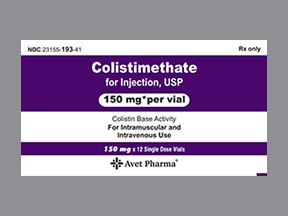
Colistimethate Sodium (cba) Coupons & Savings Card – Discount Prices from $11.28
Generic for: Coly-mycin m
My prescription
Edit
150MG, Colistimethate Sodium (cba) (1 Solution Reconstituted)
Select pharmacy

CVS
$40.50
COUPON PRICE
Walgreens
$11.28
COUPON PRICE
Albertsons
$19.66
COUPON PRICE
Walmart
$21.88
COUPON PRICEColistimethate Sodium (cba) savings card
Show this card to your pharmacist
Walgreens
$11.28
BIN
ID
PCN
GRP
011867
LH1269F53E
HT
LABH001
Powered by
More prescriptions for bacterial infection
More prescriptions for bacterial infection
Price history for Coly-mycin M (brand) & Colistimethate Sodium (cba) (generic)
1 Solution Reconstituted, 150MG
Average retail price for Coly-mycin M
Average retail price for Colistimethate Sodium (cba)
Average SaveHealth price for Colistimethate Sodium (cba)
Our price history data is based on aggregated prescription data collected from participating pharmacies in America. Our prescription data updates daily to reflect the latest price changes. If you notice a missing data point, it means there wasn't sufficient data available to generate a monetary value for that date.
We analyzed Colistimethate Sodium (cba) prices for (150MG, 1 Solution Reconstituted) over the last 12 months. The average retail price was $310.00, while the average price using the SaveHealth discount card was $24.60. That's a savings of approximately 92.06% when using our Colistimethate Sodium (cba) coupon.
Compared to the generic version, Coly-mycin M had an average price of $48.87 over the same time period. With the SaveHealth savings card, Colistimethate Sodium (cba) is 49.66% cheaper on average than Coly-mycin M.
*Retail prices are based on pharmacy claims data, and may not be accurate when we don't have enough claims.
Colistimethate Sodium (cba) dosage forms
Dosage Quantity Price from Per unit 150MG 1 Solution Reconstituted $21.88 $21.88 150MG 6 Solution Reconstituteds $105.12 $17.52 150MG 10 Solution Reconstituteds $169.20 $16.92 150MG 12 Solution Reconstituteds $201.24 $16.77
| Dosage | Quantity | Price from | Per unit |
|---|---|---|---|
| 150MG | 1 Solution Reconstituted | $21.88 | $21.88 |
| 150MG | 6 Solution Reconstituteds | $105.12 | $17.52 |
| 150MG | 10 Solution Reconstituteds | $169.20 | $16.92 |
| 150MG | 12 Solution Reconstituteds | $201.24 | $16.77 |
